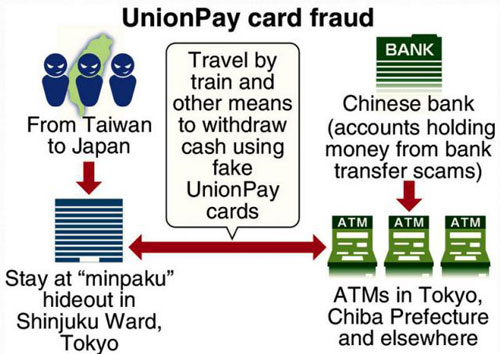Three Taiwanese stayed in condo while allegedly stealing S$40 million from ATMs in Japan
AsiaOne
02 May 2017

Photo: The Japan News/Asia News Network
Three Taiwan nationals who were arrested on suspicion of using forged
China UnionPay cards to illegally withdraw cash from automated teller
machines in Japan used an unauthorized "minpaku" (short-term rental)
private residence as their hideout while repeatedly carrying out the
crime, it has been learned.
$39,178,165 CDN, $40 million Singapore
The three were arrested on March 22 on suspicion of involvement in a
large-scale scheme that used fake cards to withdraw a total of about
¥3.2 billion (S$40 million) in cash at ATMs from Chinese bank accounts.
They stayed in a private condominium unit used as a minpaku lodging
that was operated without authorisation, and illegally withdrew about
¥11 million in cash while in Japan, according to investigative sources.
The Metropolitan Police Department is increasingly concerned that
criminal organisations are using unlicensed minpaku lodgings for such
crimes, abusing the system in which minpaku service providers do not
need to clarify their locations and are not required to confirm the
identity of users.
A 24-year-old man and two other suspects, all Taiwan nationals, stayed
in the about 38-square-meter rented condominium unit with one room, a
living-dining room and kitchen in Shinjuku Ward, Tokyo, the sources
said. They booked the unit on an online minpaku reservation site and
paid for the accommodation beforehand.
A man who is believed to have taken the trio to Japan from Taiwan and
given them instructions also stayed in the room, the sources said.
The operator of the minpaku lodging is a foreigner who lives in the
unit. Without obtaining authorisation to operate a minpaku business,
which is required under the Hotel Business Law, he sublet the unit
without the permission of the house's owner, sources said.
When lodging operators provide rooms to foreign guests, the law
requires the operators to keep the passport numbers of foreign users.
But the operator did not ask them to show him their passports when he
gave them the key to the room.
The suspects reportedly saw a classified employment advertisement in a
Taiwan newspaper and applied for lottery-related work when they were in
Taiwan. The man brought the trio from Taiwan to Japan on a short-stay
visa on March 7. After arriving in Japan, they stayed two nights at a
hotel, then moved to the minpaku lodging.
For about two weeks until they were arrested, they went to Chiyoda
Ward, Tokyo; Ichikawa, Chiba Prefecture; and other places by train and
withdrew about ¥11 million from ATMs.
The targeted bank accounts included some Chinese accounts that
contained money from bank transfer scams carried out in China,
according to sources.
Police found a great deal of UnionPay card-related information on a notebook computer discovered in the unit.
In a separate case in August last year related to fake UnionPay cards,
the MPD arrested a 23-year-old Tawian national who also stayed in a
minpaku lodging in Ota Ward, Tokyo. The man is believed to have chosen
a minpaku for his stay because no one entered his room for cleaning or
other reasons.
Many unauthorized minpaku lodgings do not publicly release details of
their locations. Therefore, it takes time for police to specify
suspects' hideouts, even after their arrest, which could let an
accomplice get away in some cases, the sources said.
top contents
chapter previous next
